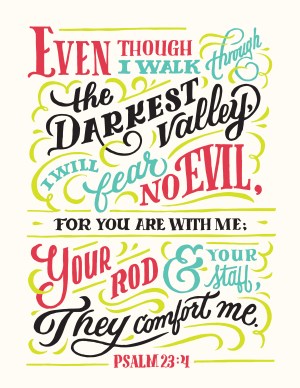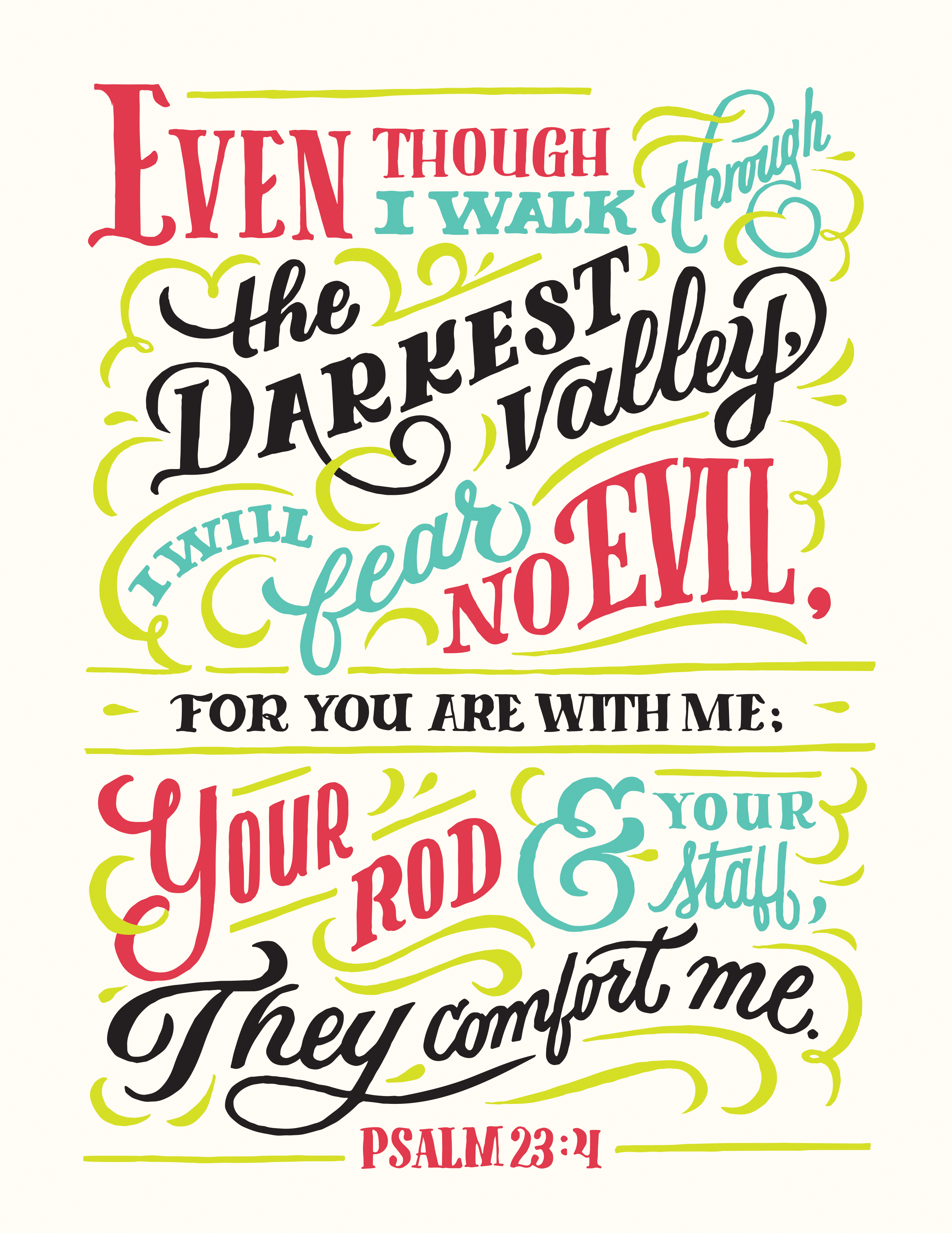
Psalm 23 offers hope and encouragement like no other poem. Countless Jews and Christians have found in this short psalm solace in the face of life’s greatest challenges, including death. Two verses in particular (4 and 6) have given the psalm such power:
Yea, though I walk through the valley of the shadow of death, I will fear no evil … and I will dwell in the house of the Lord forever. (KJV, used throughout)
But some modern readers find its language foreign and patronizing.
Most readers today tend to think of sheep as dumb farm animals that are easily manipulated. Suggesting that we are like docile creatures that follow a leader en masse touts mindless religiosity. Our culture teaches us to be independent and self-sufficient. To compare humans to sheep is offensive.
Consider Pink Floyd’s sarcastic rendition of Psalm 23—“Sheep,” from the 1976 album Animals, which drew from George Orwell’s novella, AnimalFarm. The opening lines evoke the pastoral scene from Psalm 23, but with sinister overtones (“Only dimly aware of a certain unease in the air,” “Things are not what they seem”) and faint religious allusions (“I’ve looked over Jordan”).
The next section highlights the pliability of humans who behave like sheep (“pretending the danger’s not real, meek and obedient you follow the leader”). The third stanza opens with the words of Psalm 23, but they are sung in a threatening, menacing tone to contrast the soothing message of the psalm:
The Lord is my shepherd, I shall not want
He makes me down to lie
Through pastures green he leadeth me the silent waters by.
With bright knives he releaseth my soul.
He maketh me to hang on hooks in high places.
He converteth me to lamb cutlets …
The “psalm” goes on to unmask the shepherd as a self-serving capitalist whose apparent care for the sheep is nothing but exploitative: the sheep are destined for slaughter.
Even some Bible scholars balk at the poem’s language. David Clines, professor of biblical studies at the University of Sheffield, said,
We all know that in reality shepherds do not keep sheep for the sake of the sheep, as acts of altruism; they keep sheep for wool and for milk, indeed, but ultimately and usually for slaughter. … At the end of the poem, the sheep arrives at the “house of the Lord,” the temple. Here the aspect of death lies just beneath the surface; for everyone knows that there is only one reason why sheep go to the temple.
Clines believes the psalm propagates passive acceptance of injustice, oppression, and exploitation. People with such suspicions see organized religion either as the oppressor or as complicit with the oppressors.
In light of such contemporary objections, we need to look at the psalm once again to grasp why it’s not about compliance to brutal injustice but about trust in a good God.
The Problem of Ruminating Sheep
First, we must remember that it is a poem written in a context and time very different from ours. Readers, therefore, need not just a good understanding of poetic imagery and imagination, but also of sheep and the ancient Near East. It is also important to try to understand, as best as possible, the original wording of the poem.
Many modern translations, such as the New International Version and the New Revised Standard Version, replace the King James Version’s “valley of the shadow of death” with “darkest valley.” The reason is technical and complex, says Bible scholar Adrian Curtis. He believes “the element ‘death’ may not refer to human mortality, but [to] a superlative idea, such as ‘deathly shadow,’ i.e., extreme or even total darkness.” Thus, the reference is not to death but to danger, he says. Further,
Just as the sheep can rely on the shepherd for guidance through the most dangerous terrain, so the psalmist expresses confidence that he need fear no harm because God is with him. He is protected by the shepherd’s staff and crook (v. 4c); the former is probably to be thought of primarily as a weapon, e.g., for warding off wild beasts, the latter as a means of support.
To be sure, the shepherd does indeed defend the sheep from danger. But the Hebrew tradition favors “shadow of death.” So does the Septuagint, which is rendered in the English translation as “in the midst of the shadow of death.”
Understanding the behavior of sheep and the geography and topography of ancient Israelite landscapes only reinforces this word choice.
Sheep are ruminants—vegetarian animals with a special digestive system. First, they cut with their teeth the grass they feed on and then swallow it whole. The food is then predigested in the stomach and eventually regurgitated. The sheep then lie down and keep the regurgitated food, “cud,” in their mouths and chew on it at length—a process called “chewing the cud.”
Chewing the cud is a demanding task, and ruminants typically lie down and lapse into a semiconscious state. At this stage, they are particularly vulnerable to predators. This is why ruminants wander to and fro between “feeding grounds”—the green pastures of verse 2—and “resting grounds.” The feeding grounds are where predators expect them to be. So ruminants tend to eat hurriedly before withdrawing again to various hideaways.
Both the poet and his readers knew that they themselves were vulnerable creatures living in a hostile environment.
The sheep of Psalm 23 has to move from its relatively safe resting grounds to new feeding grounds. Frequently, however, the terrain allows only a limited number of passages between feeding and resting grounds, forming so-called “forced passageways.” Often sheep are forced to travel through steep, narrow valleys strewn with large boulders that cast deep shadows right next to where the sheep have to pass. Predators know this, too. So they lie in ambush in the shadows of those boulders, which thereby—quite literally—become shadows of death.
For the psalmist, the sheep calls to mind his own vulnerability, and the shepherd calls to mind God preserving his life (vv. 5–6). The poem also allows readers to apply the shepherd image to all the dangers they face—even death—and to live with confidence in God’s unfailing, protective love.
Spanish Bible scholar Luis Alonso Schökel reminds us, “What has been written with imagination must be read with imagination.” Imaginative interpretation engages both our intellect and our emotions, helping us to see our own lives in fresh ways through poetry. Metaphor shapes our thinking and how we behave because it helps us understand the complex and difficult aspects of life with the aspects of life that are familiar to us.
The Shepherd-Host Jesus
As profound as the shepherd-sheep metaphor is, something peculiar happens in the final two verses of Psalm 23: the imagery shifts to that of host and guest. Life is complex, so the imagery of sheep and shepherd alone cannot cover all the eventualities of life. Thus, the psalmist blends two metaphors to illustrate how God interacts with us.
Note the similarity between God as shepherd letting the sheep “lie down in green pastures” (v. 2)—not hiding away in the secret resting grounds, but chewing the cud in plain sight of its predators—and God as host, spreading a banquet for the poet “in the presence of mine enemies” (v. 5). There are indeed “forced passageways” in our own lives. Danger, sickness, heartache, and violence surround us on every side. But God, who is both shepherd and host, is always with us. He watches over us, protects us, provides for us, and gives us hope in the midst of the most horrendous circumstances—even in death, which can be so cruel and violent.
This Shepherd-Host has come to us, of course, in Jesus Christ. Jesus applied the imagery of Psalm 23 to himself and has assured us that he is “the Good Shepherd.” He walks with his sheep through valleys of death. And he ultimately laid down his life for his sheep so that they might be once and for all delivered from death (John 10:11).
Christ as Shepherd-Host is beautifully explored and expressed in Kanye West’s 2004 song “Jesus Walks.” The lyrics contain the words “I walk through the valley of the shadow where death is,” clearly alluding to our psalm. The refrain “Jesus walks with me” evokes a different kind of interaction between Jesus—who takes the place of the shepherd in the song—and the people in need depicted in the music video. We don’t need to accept all the implicit theology of the video to see that he is evoking this psalm and the hope it offers, especially in lines like this one:
Yo, we at war We at war with terrorism, racism But most of all, we at war wit ourselves (Jesus walks) God show me the way because the Devil’s trying to break me down (Jesus walks with me)
Two millennia after Jesus was born, he walks not just with me and you, but also with the untold masses of innocent victims of violence and injustice. They may not know that Jesus is with them, of course, which is one reason we are called to tell them this good news.
Hope for the Here and Now
Scholars have increasingly recognized that the Hebrew original of the final verse does not read “and I will dwell in the house of the Lord forever,” as the King James Version has rendered it. Rather, the original says, “I shall return to the house of the Lord for many days to come” (my translation).
The psalm, in its original language, does not directly promise eternal life for believers. This may seem like a loss for us, but plenty other texts in Scripture promise such a blessing. Verse 6 assures the beleaguered pilgrim that divine goodness and faithfulness will remain with him throughout his life. This sheep-guest-human knows with absolute certainty that he is not alone in this world, even when all the odds are stacked against him and when he is so vulnerable that he cannot help himself.
This psalm gives us hope for the here and now, hope for life before death, in whatever dark night of the soul or body we may experience. We live in a time when many Christians around the world are violently persecuted, when unhinged terrorism seems to spread like wildfire, and when many people suffer the consequences of unrestrained greed and human consumption. A famous Latin proverb says, Homo lupus homini (“Man is wolf to man”). Yet our predators, human or otherwise, cannot ultimately overcome us. God, in Christ, walks through the valley with us, and he leads us to the house of the Lord, our feeding ground for hope.
Knut M. Heim is tutor in Old Testament at Trinity College Bristol (UK) and, starting this summer, will be professor of Old Testament at Denver Seminary.











